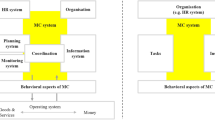Abstract
The process of knowledge objectification entails several advantages in terms of capitalising the owned knowledge, facilitating its localisation, retrieval and reuse, establishing a common cognitive base and so on. However, the management of knowledge objects is far from simple, especially in the case of large organisations with an extensive and dispersed production of knowledge objects. In principle, this issue seems to have a simple solution, that is, merging the various cognitive bases in a single one. In practice this raises several questions, both on the technical-cognitive and the organisational side. The paper deals with this topic, by discussing the case of Ernst & Young that three years ago started a project aimed at developing a global knowledge platform. In particular, it intends to identify and discuss the main problems (and possible solutions) raised by the management of large amounts of knowledge objects scattered in different parts of the organisation. In addition, it aims to show how a codification, technology-based approach to knowledge management cannot be successfully pursued without taking into account the relevant social and organisational aspects.
Similar content being viewed by others
References
Bolisani E and Scarso E (2011) Knowledge codification and ICT use in business networks. In Encyclopedia of Knowledge Management (Schwartz D and Te'eni D, Eds), Vol. 1, 2nd edn, pp 506–514, IGI Global, Hershey, PA.
Davis JG, Subrahmanian E and Westerberg AW (2005) The ‘global’ and the ‘local’ in knowledge management. Journal of Knowledge Management 9 (1), 101–112.
de Pablos PO (2004) Knowledge flow transfers in multinational corporations: knowledge properties and implications for management. Journal of Knowledge Management 8 (6), 105–116.
Earl MJ (2001) Knowledge management strategies: toward a taxonomy. Journal of Management Information Systems 18 (1), 214–233.
Jasimuddin SM (2008) A holistic view of knowledge management strategy. Journal of Knowledge Management 12 (2), 57–66.
Jonsson A and Kalling T (2007) Challenges to knowledge sharing across national and intra-organizational boundaries: case studies of IKEA and SCA packaging. Knowledge Management Research & Practice 5 (3), 161–172.
Kumar JA and Ganesh LS (2011) Balancing knowledge strategy: codification and personalization during product development. Journal of Knowledge Management 15 (1), 118–135.
Lee H and Choi B (2003) Knowledge management enablers, processes, and organizational performance: an integrative view and empirical examination. Journal of Management Information Systems 20 (1), 179–228.
Leedy PD and Omrod JP (2005) Practical Research – Planning and Design, 8th edn, Pearson, Upper Saddle River, NJ.
Maier M (2007) Knowledge Management Systems: Information and Communication Technologies for Knowledge Management, 3rd edn, Springer-Verlag, Berlin.
Malhotra Y (2003) Why knowledge management systems fail: enablers and constraints of knowledge management in human enterprises. In Handbook on Knowledge Management (Holsapple CW, Ed), Vol. 1, pp 577–599, Springer, Berlin.
Moffet S, McAdam R and Parkinson S (2003) An empirical analysis of knowledge management applications. Journal of Knowledge Management 7 (3), 6–26.
Newell S, Bresnen M, Edelman L, Scarbrough H and Swan J (2006) Sharing knowledge across projects. Limits to ICT-led project review practices. Management Learning 37 (2), 167–185.
Nielsen BB and Michailova S (2007) Knowledge management systems in multinational corporations: typology and transitional dynamics. Long Range Planning 40 (3), 314–340.
Oshri I, van Fenema P and Kotlarsky J (2008) Knowledge transfer in globally distributed teams: the role of transactive memory. Information Systems Journal 18 (6), 593–616.
Paik Y and Choi DY (2005) The shortcomings of a standardized global knowledge management system: the case study of Accenture. Academy of Management Executive 19 (2), 81–84.
Sieloff CG (1999) ‘If only HP knew what HP knows’: the roots of knowledge management at Hewlett-Packard. Journal of Knowledge Management 3 (1), 47–53.
Yin RK (2003) Case Study Research: Design and Methods, 3rd edn, Sage Publications, Thousand Oaks.
Author information
Authors and Affiliations
Corresponding author
Rights and permissions
About this article
Cite this article
Padova, A., Scarso, E. Managing large amounts of knowledge objects: cognitive and organisational problems. Knowl Manage Res Pract 10, 287–295 (2012). https://doi.org/10.1057/kmrp.2012.7
Received:
Accepted:
Published:
Issue Date:
DOI: https://doi.org/10.1057/kmrp.2012.7




